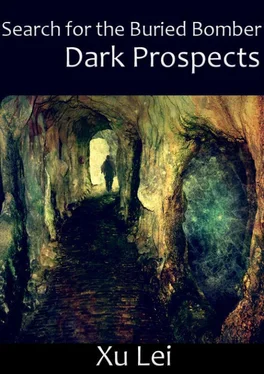I considered the situation for nearly three hours. The mist still hadn’t dispersed. The pain in my hand was indescribable. I thought again of Wang Sichuan, of whether he was alive or dead, and I wondered where Old Cat and the rest were now. And how were we supposed to get back? Our problems were endless. In this anxious state, I fell into a muddled sleep. I didn’t know it at the time, but this was the last bit of rest I would get for a long while. It was only after the bad dreams that filled this short sleep that the real nightmare would begin.
When I awoke, I tried once more to talk to Yuan Xile, but again got nowhere. The poor woman seemed to have reached the very limit of fear. Even the slightest sound would set her off. She’d immediately curl up tighter whenever I tried to speak to her, her eyes involuntarily avoiding mine. Instead I began discussing with the deputy squad leader and the rest how we’d get out of here and what route we should use. The one thing worth celebrating was that Ma Zaihai said their raft should still be where he left it. If the current wasn’t too strong, we could paddle it back upstream. We didn’t know whether we should travel back up the main underground river or try to locate the sinkhole where we’d fallen in. The wisest route would be the one Yuan Xile had taken, but which was that? Had she still been in her right mind, she might have led us some of the way.
“If only we had some kind of blueprint or map,” said the deputy squad leader. “There’s definitely one around here. If we can find it, we’ll know how the Japanese planned this place out and will be able to find the shortest, safest way back. Many of the facilities here are already ruined,” he said. “It wouldn’t be smart to just heedlessly rush back.” I nodded. These engineering corpsmen can glean a lot just looking at a blueprint, though I suspected that all such materials were destroyed when the Japanese left.
As we discussed the matter back and forth, my mind gradually emerged from its stupor. I began to relax. We were heading back. We knew what awaited us at our destination, and, moreover, we had choices. No matter what, it’s always good to be given a choice. That little aphorism was something I thought up later.
None of us, however, had realized the most essential problem: It wasn’t our journey back. It was right before our eyes. Ten hours later, after settling upon an approximate plan and counting how much food and fuel we had left, we once more looked through the small aperture in the door. Outside was still pitch-black. Suddenly we realized the true crux of the matter. How long would the mist remain out there? A day or a whole month? Nobody else had considered this problem until I brought it up. They all assumed that soon enough it would begin to dissipate. Even after I raised the issue, there was a slight nervousness, but everyone remained hopeful. Ma Zaihai said that while the mist had not risen all the way up last time, it had retreated quickly. He was sure it would be gone within a few hours. And if not, the crosswind would have thinned it out considerably. I took it for granted that he was right. In this sort of situation, it is always better to find a reason to feel relieved than to look for gratification in having suspected the worst. Still, the force of the river smashing against the bottom of an unfathomably deep abyss had caused this demonic mist to rise, and even now the water continued to fall. So long as the sluice gates remained open, the mist would continue to roll upward. How could it do anything else?
We passed the next five or six hours in a state of silent unease. The mist continued to fill the air outside our chamber and showed not the slightest sign of having begun to disperse. The indistinct panic we’d felt earlier gradually intensified. We had no choice but to admit that the mist would not be disappearing anytime soon. Once more we discussed our options. The plans we’d made and the rousing rhetoric we’d spouted ten hours before now seemed no more than a joke. The atmosphere had become rather awkward.
The deputy squad leader and Ma Zaihai asked whether we shouldn’t just be patient. Wouldn’t overthinking just further confuse the situation? I told them that we had to face reality. So long as the floodgates stayed open, the mist would only get thicker and thicker—no way would it dissipate. “That being the case,” I said, “there are a few steps we’ll have to take: First, we’ll need to distribute the water and grain rations. We need to do our best to survive as long as we can and hope that we’ll be able to wait until the mist dissipates. Second, we have to actively think of a way out of here. The first measure is particularly important,” I said. “Even though the mist might be gone in an hour, we need to prepare as if we won’t be out of here for a month.”
Ma Zaihai looked embarrassed. “Actually, we’ve got plenty of rations,” he said. They had abandoned the majority of the equipment in their hurry to come rescue us but had kept the food, bringing along several bundles of hardtack and condensed vegetables. But he and Chen Luohu only had two canteens between them, one of which wasn’t even full. My heart fell as I heard this. At once my throat felt parched. Our pant legs were already dry, otherwise we could have wrung the water out of them. I remembered how, shortly after entering the cave, I’d wondered what I would do should we run out of water and whether, if need be, I could drink my own urine. I cursed my naïveté. Now I would be put to the test. My mind turned at a dizzying speed, but it was no use and I soon despaired.
I had had only a few similar experiences being trapped, the most dangerous being one time in eastern Sichuan in 1959. I’d only recently begun working as a prospector. On a cave-prospecting job organized by the local geological bureau, we were trapped inside an air cavity by rising water for three days and two nights. Luckily, the water finally receded. There were ten or twenty of us at the time, and our food and water rations were abundant. What we had lacked most was experience, and soon the tears began to flow. Really, though, it wasn’t so bad. Now we were full of experience, but had almost no water. Compared to this, being stuck for a few days and going on a bit of a crying jag was hardly a big deal.
“Waiting in here until the mist retreats will require a huge amount of luck,” said Ma Zaihai, “but if one of us can get out, he might find something useful. What if we find an old-fashioned water or steam pipe, for example, and there’s still water inside? Shouldn’t we give it a try?”
Where are we going to find something like that, I thought to myself, only to see him squat down and point to the air vent running along the baseboard. “This vent is connected to the filtration system,” he said. “The technology was used by the Germans during World War II and later studied by the Soviet Union. Today, the majority of our underground fortifications use an improved version of this system. There’s probably a water pipe somewhere inside.” Hearing this, I seemed to catch sight of survival, but the vent was just wide enough for a person’s head. How was anyone supposed to wriggle his way in?
Ma Zaihai said he had a small frame, so it shouldn’t pose too great a problem. He lay facedown, removed the anti-mouse grate, and began to squirm into the vent opening. I too dropped down, but with one glance I knew he’d never make it. He was a man, after all, and a small soldier is still not that small. After performing a number of odd and amusing movements, Ma Zaihai could still do no more than stick his head in sideways, while the rest of his body remained outside. At last he wrenched his neck and gave up. As for the rest of us, Chen Luohu had a large head, I’ve got wide shoulders, and the deputy squad leader already had a head injury. Yuan Xile was hardly worth mentioning. This idea was a dead end.
Читать дальше












